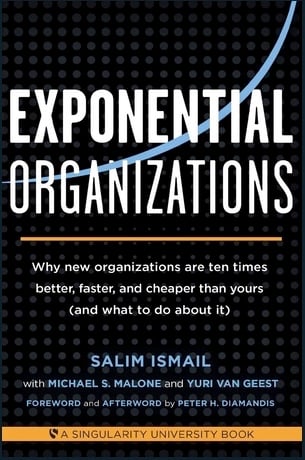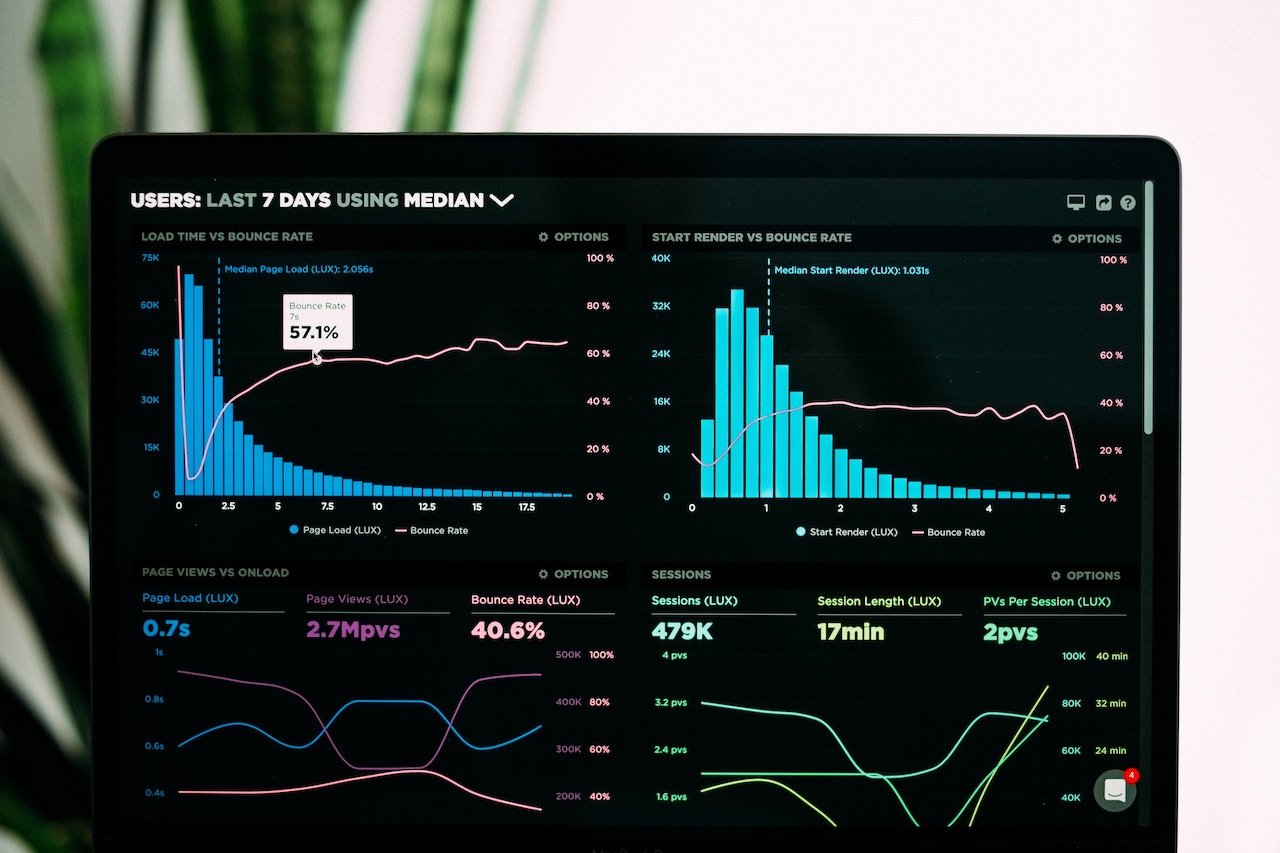UPDATED: As of 25 August 2022
Should brands aim to be different or distinctive? What is the difference between the two, and how do these strategies add value to the branding equation? We take a closer look at shared evidence and form our own conclusions on why distinctiveness stumps differentiation.
Insight: Research shows that brand perception scores are quite similar across all brands regardless of whether they are perceived as different or not.
Data: Distinctive brand campaigns featuring recognisable brand ideas and assets achieve a +62% stronger short-term profit ROI vs campaigns which didn’t. (Ebiquity)
Key Action Point: Instead of pushing for differentiation, it’s time for brands to focus on building distinctive qualities to stand out from everyone else in the market.
WATCH: Step Change CEO Ashton Bishop scratches beyond the surface of brand building.
For many years, we have come to believe that brands that differentiate themselves from everyone else are more successful. Throughout this time, we have pushed for differentiation, thinking brands that don’t will fail.
So what’s changed?
A study conducted by Byron Sharp, Jenni Romaniuk, and Andrew Ehrenberg proves otherwise. Their study, highlighting key findings from 17 markets, shows that “perceived differentiation is not necessary for a buyer to buy a brand or for a brand to be successful.”
In the same report, it was observed that many consumers did not consider the brands they bought as differentiated. The results across seven consumer brand sectors in Australia also showed that it didn’t matter to them whether the brands they bought were different or not, as long as they satisfied their need and met their price point and location preferences.
The report goes on to conclude that many of the brands included in the survey that were not perceived as being different were just as successful.
So in light of these empirical findings, we wonder whether everyone’s push for differentiation in brand strategy has been misguided all along.
Distinctiveness vs Differentiation
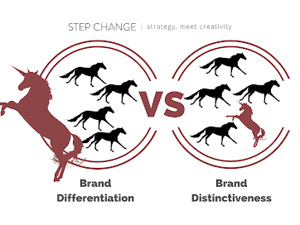
Let’s start by defining some terms.
Brand differentiation is setting yourself apart from the competition by highlighting key aspects, features, and benefits of your brand and how it adds value to your customers.
Brand distinctiveness takes that up a notch. To be distinct as a brand means standing out with impact (using brand assets such as brand name, logos, colours, messaging, etc.) so that buyers can easily identify, recall, and buy the brand.
Both are correlated but also very different. Here’s how.
1. Distinctive brands are more recognisable
In a study by Jenni Romaniuk at the Ehrenberg-Bass Institute, distinctive brand assets achieved an average +34% higher advertising recognition.
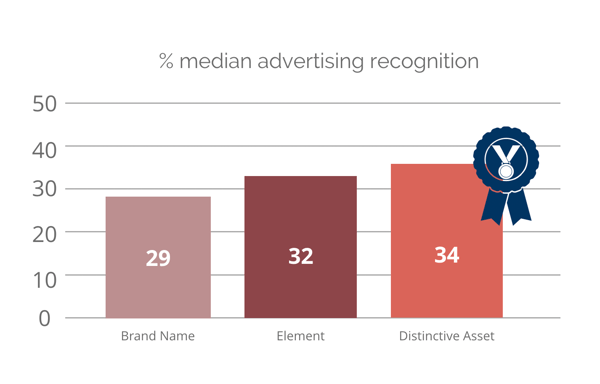 Data from Brand Assets as a Source of Strength, Jenni Romaniuk, 2014
Data from Brand Assets as a Source of Strength, Jenni Romaniuk, 2014
For example, Commonwealth Bank customers do not patronise the brand because they love the colour yellow, but seeing this colour makes it easy for them to identify the advertisement, offering, or value associated with the brand.
Table 1: Brand user perceptions of differentiation in Banking (Australia) categories
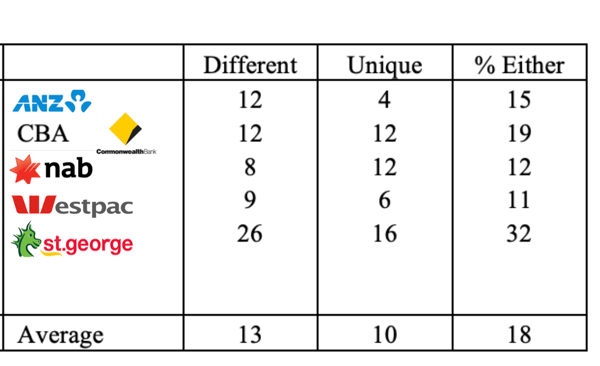
In the above table from the report, we see the proportion of each brand’s customer base that gave either a response of different or unique. This shows that only about 1 in 10 current customers perceive the brand to be different or unique, and 15–20% state it is either.
This shows that many buyers do not think their brands are different from other brands, proving that brand differentiation cannot be a critical driver in buyer behaviour.
2. Distinctive brands are more profitable
“Distinctive brand campaigns” featuring recognisable brand ideas and assets achieved a +62% stronger short-term profit ROI vs campaigns that didn’t in an analysis of 1,300 campaigns.
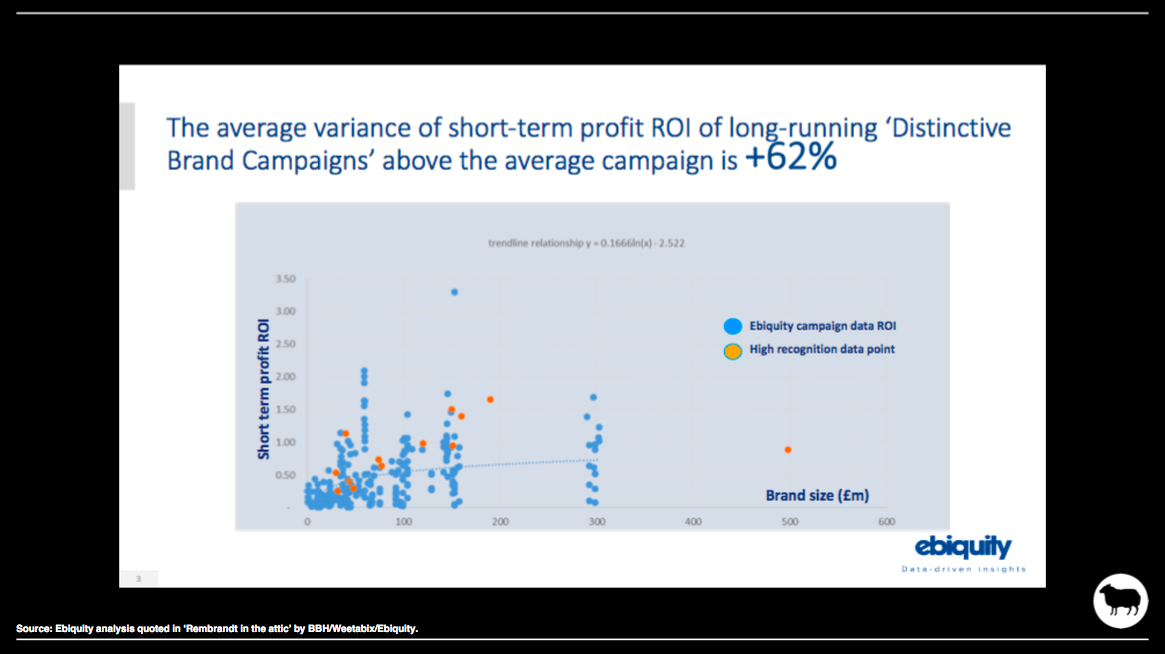
Rather than focusing on differentiated and unique value propositions, your brand’s distinct qualities help consumers to identify, recall, and choose your brand above everyone else.
It triggers brand associations that clear the path to purchase, and in a time where there are so many brands to choose from, this ensures consumers know exactly who to pick when they have to make that choice.
3. Distinctive brands overcome price sensitivity
People make emotional decisions and then support these with rational justifications. When you are a consistent and distinctive brand, you pave the way for recognition which leads to trust and eventually, loyalty.
When people recognise your value and connect with your identity as a brand, they are likely willing to pay more for your offering than get it elsewhere for a lower price.
In addition to buying on value beyond price, distinctiveness also encourages repeat purchases and helps you introduce new products with ease — thanks to the recognition and familiarity that you have nurtured and associated through your distinctive branding assets.
4. Distinctive brands have engaged and motivated teams
In addition to driving customer goals, distinctiveness also plays a part internally. According to Linkedin Business:
- Training expenses of well-regarded brands are brought down by as much as 50%.
- 72% of recruiting leaders worldwide believe that the employer brand significantly impacts hiring.
- 50% of employers report more qualified applicants.
- Strong branding is associated with a 28% reduction in organisational turnover.
- Inconsistent branding embarrasses employees which lowers morale.
Distinctive branding helps you share your values and mission not only with customers but also with the people you work with. When this sense of purpose resonates, you get highly engaged teams who feel like they are part of a winning team doing meaningful work.
Engaged employees are also proven to stay with you for longer, and are more productive and even profitable. This also attracts talent and partners who have the same beliefs and qualities.
5. Distinctive brands close the gap between marketing and sales
At the end of the day, marketing and sales should go hand in hand. You can use distinct brand assets as leverage in your marketing efforts. To help put things in perspective, consider the following statistics:
- Uniformly presented brands are 3.5x more visible to customers.
- Consistent brand presentation increases revenue by 33%.
- Inconsistent branding damages a company’s reputation and credibility.
When you deliver consistent and distinct branding in your marketing regardless of the format or medium you’re using, you position yourself as a credible company that knows what they’re doing, who they are, who they serve, and what they stand for which gets you one step out of the awareness graveyard and helps you get the sale.
A Combination of Success Factors
While the game has gone from differentiation to distinctiveness, the smarter perspective is to know that success is a combination of different factors. In their work “Effectiveness In Context”, Les Binet and Peter Field name six factors that lead to effective brand building.
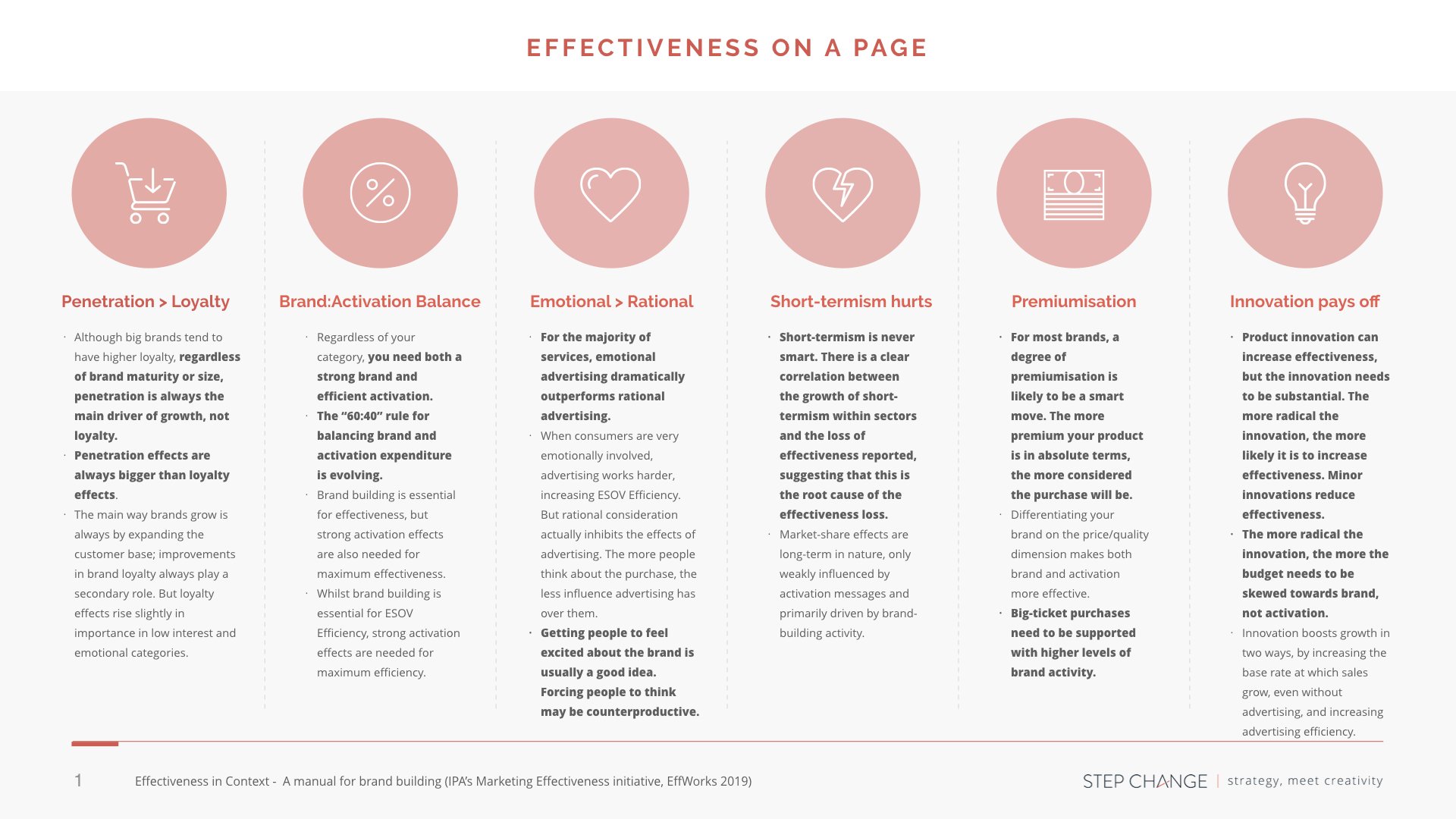
- Penetration over loyalty – the expansion of your customer base
- Brand to activation ratio – the balance between building your brand and getting it out there
- Emotional over rational – the value of resonating and connecting on an emotional level
- Consequences of short-termism – overlooking long-term success and security for immediate profit
- Value of premiumisation – the planning and thinking behind premiumisation and pricing
- The payoff from innovation – the pursuit of continuous improvements
Understanding these factors, consistently executing them and pairing them with clever brand assets is the key to building a strong and distinctive brand that resonates.
Tying It Together
Now that we know the difference between brand differentiation and distinctiveness, it’s important to re-assess how each of these can play a role in your marketing strategy.
Whether it's time for you to focus on building up your brand’s distinctive qualities to stand out in a highly dense and competitive marketplace or highlighting your unique selling point, both are complementary and help make you become more visible to your target audience.
The bottom line is that differentiation won’t always be enough, and one way to take it up a notch is through distinctive brand building.











